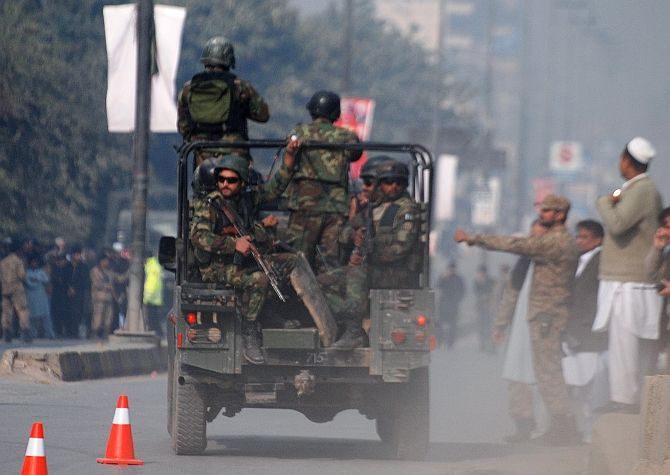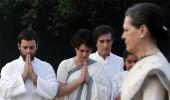
If the bulk of the Pakistani population and the all-powerful army are now against radical elements, there is indeed hope that Pakistan's India policy will be more realistic and less ideology driven, argues Colonel Anil A Athale (retd).
On December 16, 2014, terrorists attacked the Army Public School in Peshawar and killed over 132 school children. Many believe this traumatic event changed Pakistan and the terrorists who earlier had public sympathy -- if not outright support -- became enemy number one even overshadowing India, the perennial enemy.
The Pakistan army launched a major anti-terror operation and the Pakistan government and army promised that action will be taken against 'all' terrorists. However, almost two years after the event, there was very little evidence in the public domain of Pakistan acting against terror organisations like the Lashkar-e-Tayiba or the Jaish-e-Mohammed which target India.
Prime Minister Narendra Modi made a 'surprise' stopover in Pakistan in December to see his Pakistan counterpart Nawaz Sharif. Many sceptics dubbed it a mere photo-op. Critics of the government's policy on the outreach to Pakistan found justification for their scepticism when on January 2, 2016, six heavily armed infiltrators from Pakistan attacked the Indian Air force airfield at Pathankot, close to the India-Pakistan border.
Unlike the Mumbai attack on 26/11, this time round, Pakistan did not the deny possible involvement of its nationals in this attack and promised to take action. Of late unconfirmed reports have emerged that Jaish leader Masood Azhar is indeed under detention.
Given the need for Pakistan to be circumspect (as there is a large constituency of radicals who support him) one can understand the low key posture. The jury is still out on the steps Pakistan takes against the JeM.
Given all these facts and the deep historical roots of anti-Indianism in Pakistan, the logical question is so what has changed now?
The answer is the hanging on February 29 of the murderer of then Punjab governor Salmaan Taseer. As an indicator of Pakistan's seriousness in cracking down on Islamic radicals, this indeed is a watershed moment.
I feel bold to make this statement despite the fact that at his funeral lakhs of people gathered in Rawalpindi. He was given martyr status and eulogised by the religious parties.
One always knew that Pakistan's religious parties had the power to muster large crowds, so this does not necessarily prove that the hanged murderer had overwhelming popular support. Given the huge population, gathering crowds in excess of lakhs is not such a great feat in the subcontinent. More significant was the fact that the Pakistan electronic and print media gave the funeral very little coverage and prominence. This was obviously done at the government's behest.
Given the political equations in Pakistan, the decision to hang the murderer must have been taken by the civilian government with the army's full backing. This shows the Pakistan army is committed to dealing with radicalism with an iron hand.
This is indeed a change from the earlier stance when anyone who targeted the so-called 'blasphemers' was handled with kid gloves. The murderer of American journalist Daniel Pearl, Omar Saeed Sheikh, is yet to be punished even after 14 years.
The two biggest takeaways from this episode are the army's commitment and the civilian government's resolve. For a very long time elected governments were wary of taking action as the bulk of the population, including the middle class, was thought to be sympathetic to extremist views. It seems the Peshawar massacre has changed the narrative for the majority in Pakistan. The fear psychosis in Pakistan was evident when in the wake of a rumour, all schools were shut down recently in Pakistani Punjab, its political heart.
If the bulk of the Pakistani population and the all-powerful army are now against radical elements, there is indeed hope that Pakistan's India policy will be more realistic and less ideology driven.
As a Pakistan watcher for the last 30 years, I have noticed a trend where the Pakistani middle class and professionals are returning to the 'Jinnah vision' that meant for Pakistan to be a Muslim majority state and not an Islamic state. Declining oil prices and closing the money tap to radical madarassas will in time reduce the influence of the Muslim radical clergy.
There is a Russian proverb that says the appearance of one swallow does not mean that spring has arrived. There is also an Indian proverb which says that to test if the rice is cooked or not, it is enough to taste just one grain! I feel the recent events in Pakistan are closer to the Indian proverb. It would be sad if we missed the importance of the signals emanating from our neighbour.
Just when Pakistan is de-radicalising itself, vigilante groups taking cue from faith have begun to assert themselves in India. Under the beef ban issue (not just cow slaughter), fringe elements have begun to use the hastily promulgated laws to target minorities.
The effect of this has been to give a tool to anti-social elements to target anyone with possession of beef. This is not very different from the way blasphemy laws are being misused in Pakistan. One only hopes the judiciary will intervene and stop this madness.
The media (a large part of it) is adding fuel to fire by selectively highlighting only the violence against minorities while ignoring the other side. This cultivates a tale of victimhood unrelated to the reality.
As elections to India's largest (and most backward) state approach, political parties will be tempted to play one community against the other.
Fringe radical groups have always existed in India, but what is new is that due to social media and the Internet, they have acquired a power and influence much beyond local areas. The media has the effect to magnify a local issue into a national one.
One hopes that the politicians will not fish in troubled waters. It is time for some statesmanship.
Else the positive change in the environment in Pakistan will be lost and the billion plus population of the Indian subcontinent will lose out.
Colonel Anil A Athale (retd) is a military historian.











 © 2025
© 2025